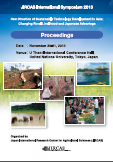Welcome Statements

Hello, everyone, and thank you for the introduction. My name is Amamiya, Director General of the Agriculture,
Forestry and Fisheries Research Council Secretariat. Planning and management are some of the areas I cover in
the secretariat. I am delighted to say a few words at the opening of the JIRCAS International Symposium 2013.
Against the backdrop of a global population increase as well as economic development of developing nations,
food supply is becoming unstable because of the increase in food demand as well as the impact of climate change.
And food crisis is volatile. It is currently remaining at very high levels. This is giving rise to problems globally,
such as riots.
In particular, in the Asian region there are 4.3 billion people living, which corresponds to 60% of the world’s
population. Furthermore, 65% of the malnourished population, or 550 million people, are living in this area, and
therefore we need to promote the development of agriculture, forestry, and fisheries, as well as food security in
order to resolve the problems of hunger as well as poverty.
Japan has maintained close relations with Asia, and this is also the case in the agriculture, forestry and fisheries
area inclusive of the project title of Agriculture Village Development. We have been contributing to the
agricultural production in Asia. From the 1960s through the green revolutions, self-sufficiency of rice and wheat
has been achieved. In the 1990s and later, processing as well as product development of agricultural products
have also been promoted, and products are being exported to Japan as well.
To achieve growth, research and development were indispensable in terms of the green revolution. High yielding
varieties have become the key, and fertilizers as well as irrigation facilities, technological development have
brought about synergies. After the green revolution, in addition to such research and development, improvements
have been made to agricultural equipment as well as processing technology. Various results of research and
development have been brought to bear.
In Japan, we are making headway in terms of functional products clarifying nutrients as well as functional
ingredients of food, which is beneficial for health. We believe that this will enrich our diet and therefore this type
of research and development should be promoted for the future.
On the part of MAFF, currently, to position agriculture, forestry and fisheries, it should be positioned as a new
growth industry, and therefore offensive agricultural policy is being promoted. This is a new policy that is being
advocated by MAFF, specifically, to increase exports by expanding the frontiers of demand by deploying the six industry strategy, establish value chain from production to consumption. Also, to accelerate the structural reform
of agriculture, production site strengthening measures have been implemented focusing on farmers as well as
farmlands. These are the three pillars we will be promoting.
In the interim plan, we will be set with issues including the decreasing number of farmers as well as the aging of
farmers. There is increasing abandoned farmland as well. With development and globalization, the environment
surrounding agriculture, forestry and fisheries in Japan is becoming more severe. On the other hand, in overseas
countries, population increase as well as economic growth is increasing food demand. And the lifestyles of
people have changed and place emphasis on healing as well as health. We believe that this is a good opportunity
for agriculture, forestry and fisheries of Japan. The agriculture, forestry, and fisheries villages can be utilized as
abundant resources.
Now, on the part of the AFFRC secretariat, promoting research and development, we are also driving efforts
focused on research to implement offensive agriculture, forestry and fisheries policy. We also have a unique
tradition, the culinary culture of Japan, and inclusive of the linkage of people, this has become very important
traditional culture. And now, for the Japanese cuisine, we have applied to UNESCO to be recognized as the
intangible cultural heritage and the result will be clarified next month.
We would like to enhance the understanding about the outstanding nature of Japanese cuisine and also increase
export and spread Japanese cuisine globally; this is what we would like to realize going forward.
Now JIRCAS is a testing and research organization to conduct comprehensive research in agriculture, forestry
and fisheries. It is also a focal point for CGIAR. We are working with counterpart organizations globally in order
to contribute to the resolving of the food and environmental issues. The symposium, organized by JIRCAS, will
be discussing the research direction for agriculture, forestry and fisheries for the Asian regions as well as measures
to achieve sustainable development for the agriculture of Japan.
In Asia, there is significant growth. We must bear this in mind, and also bring to bear the experience of JIRCAS
accumulated from the past so that we can discuss the way forward which will also be beneficial in promoting
agriculture, forestry and fisheries in Japan as well. This is indeed timely.
In addition to the activities we have pursued in the past, we will be embarking upon a new step forward in terms
of international contribution.
In closing, I would like to express my hope that there will be strengthened close relations domestically as well as
with overseas for the sustainable development of Asia and agriculture, forestry and fisheries. Development is
essential in this regard. I hope that you will actively participate in this symposium and avail yourselves of this
wonderful opportunity.
I would like to express my wish for the success of the symposium and also further development and success for
everyone present here today. Thank you.
| Date of issued | |
|---|---|
| Creator | Hirotsugu Amamiya |
| Publisher | Japan International Research Center for Agricultural Sciences |
| Available Online | |
| Issue | 2013 |
| spage | 15 |
| epage | 16 |
| Rights | Japan International Research Center for Agricultural Sciences |
| Language | eng |
